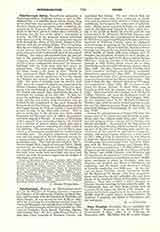

Peterborough , Diocese of (PETERBOROUGHENSIS), in the Province of Ontario, Canada, comprises the Counties of Peterborough, Northumberland, Durham, and Victoria, with the Districts of Muskoka and Parry Sound. It was erected by Leo XIII, July 11, 1882, by detaching the four former counties from the Diocese of Kingston and uniting them with the Vicariate of Northern Canada, which then included the Districts of Muskoka, Parry Sound, Nipissing, Algoma, and Thunder Bay. Rt. Rev. John Francis Jamot, at that time Vicar Apostolic of Northern Canada, was appointed first bishop. The new diocese then extended about 1110 miles from southeast to northwest, and its southern limit reached to Lakes Superior and Huron, the Georgian Bay, and a part of Lake Ontario. Bishop Jamot was born in France in 1828, and came to the Diocese of Toronto in 1853. After serving in the parish of Barrie for several years he was transferred to St. Michael’s Cathedral, Toronto, and appointed chancellor and vicar-general of the diocese. In 1874 he was appointed Bishop of Sarepta and Vicar Apostolic of Northern Canada, where he displayed zeal and energy in seeking out the Catholics of his extensive vicariate. When in 1882 the Diocese of Peterborough was formed the total Catholic population was about 30,000, of whom 5000 were Indians, with 47 churches and 25 priests, of whom 11 were Jesuits attending the western part of the diocese and the Indian Missions. After the erection of the Diocese of Peter-borough in 1882 Bishop Jamot moved his see from Bracebridge to the city of Peterborough, where he died May 4, 1886. Rt. Rev. Thomas Joseph Dowling, then Vicar General of the Diocese of Hamilton, succeeded him and was consecrated May 1, 1887. He continued the many good works of his predecessor and after two years was transferred to the Diocese of Hamilton. The third bishop, Rt. Rev. Richard Alphonsus O’Connor, was consecrated May 1, 1889. He was born at Listowel, Co. Kerry, Ireland, April 15, 1838, came to Canada in 1841 with his parents, and settled at Toronto. He was one of the first students in St. Michael’s College, Toronto, and made his theological course in the Grand Seminary, Montreal. On August 2, 1861, he was ordained priest in St. Michael’s Cathedral, Toronto, and, after serving in various parishes as pastor, and for eighteen years as Dean of Barrie, he was appointed Bishop of Peterborough by Leo XIII, January 11, 1889.
During the administration of Bishop O’Connor the western part of the diocese increased rapidly in population, and, that religion might keep pace with the material progress of the country, many churches and schools were built. On account of the large influx of settlers into New Ontario, which embraced the western part of the Diocese of Peterborough, and the development of that district in agriculture, commerce, mining, and manufacturing industries, a brief dated November 14, 1904, of Pius X constituted the new Diocese of Sault Ste Marie by detaching from the Diocese of Peterborough the western part of the District of Nipissing, with the Districts of Algoma and Thunder Bay. There was then a population f 27,000 Catholics, with 35 priests and 64 churches, in the new Diocese of Sault Ste Marie; and 24,000 Catholics, with 29 priests and 45 churches, in the portion left to Peterborough. The city of Peterborough has a population of about 18,000, about one-fourth of whom are Catholics, with two churches, one hospital, one House of Providence, an orphanage, and the largest total abstinence society in Canada, numbering over 1000 men. In the diocese are many Catholic schools, conducted chiefly by the Sisters of St. Joseph, who have a motherhouse and novitiate in the cathedral city, and have charge of the hospitals, House of Providence, and orphanage. They also conduct a select academy at Lindsay, besides directing the day school for girls. In Peterborough there are three large schools, with 19 teachers, 17 of whom are Sisters of St. Joseph. At present the Catholic population of the diocese is about 26,000, with 29 secular priests, 3 Jesuit Fathers, 50 churches, 2 hospitals, one House of Providence, and one orphanage.
R. A. O’CONNOR

